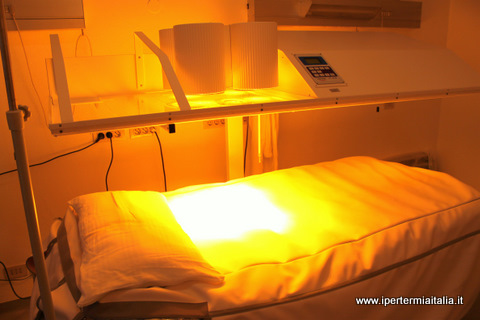Ipertermia Total Body e tumori del colon retto
Ipertermia total body e tumori del colon retto: effetti sul sistema immunitario

Il presente studio sperimentale è stato condotto per valutare l'attività della metodica nel ridurre lo stress sul sistema immunitario prodotti da intervento chirurgico (nel caso specifico priva di chirurgia per tumore del colonretto).
La conclusione è che l'attività del sistema immunitario può essere migliorata impiegando ipertermia total body prima dell'intervento chirurgico.
Ulteriori approfondimenti sono assolutamente auspicabili. Il lavoro clinico è stato pubblicato su rivista medica internazionale in lingua inglese.
Dr. Carlo Pastore
Br J Anaesth. 2012 Jul 31. [Epub ahead of print]
Effect of preoperative fever-range whole-body hyperthermia on immunological markers in patients undergoing colorectal cancer surgery.
Sulyok I, Fleischmann E, Stift A, Roth G, Lebherz-Eichinger D, Kasper D, Spittler A, Kimberger O.
Source
Division of General Anaesthesia and Intensive Care, Department of Anaesthesiology, General Intensive Care and Pain Control.
Abstract
BACKGROUND:
Previous studies have demonstrated beneficial immunological effects of fever-range whole-body hyperthermia (FR-WBH) as an adjunct to non-surgical cancer therapy. We conducted a study of preoperative FR-WBH in patients undergoing colorectal cancer surgery to evaluate perioperative, hyperthermia-induced immunomodulation.
METHODS:
The trial was conducted as a subject-blinded, controlled, randomized study. Subjects in the FR-WBH group (n=9) were treated with FR-WBH before operation under propofol sedation; the target core temperature was 39 (0.5)°C with 1 h warming and 2 h plateau phase. Subjects in the control group (n=9) were treated with propofol sedation only. Blood samples were acquired before and after treatment, after operation, and 24, 48 h, and 5 days after the end of surgery. The following parameters were measured: lipopolysaccharide (LPS)-induced tumour necrosis factor (TNF)-?, procalcitonin (PCT), interleukin (IL)-6/10, heat shock proteins (HSPs) 60, 70, and 90, human leucocyte antigen-DR (HLA-DR), and LPS-binding protein (LBP).
RESULTS:
HSPs were increased in the FR-WBH group after treatment [HSP60, 48 h postop: 143 (41)% vs 89 (42)%, P=0.04; HSP90, postop: 111 (33)% vs 64 (31)%, P=0.04; HSP70: P=0.40; FR-WBH vs control, P-values for area under the level/time curve]. TNF-? levels were elevated after surgery in the control group and remained near baseline in the FR-WBH group [24 h postop: 73 (68)% vs 151 (72)%, P=0.04]. PCT increased in both groups 24 h after surgery; in the control group, this increase was significantly higher (P=0.02). There were no significant differences for IL, HLA-DR, or LBP.
CONCLUSIONS:
The immune system to react to surgical stress, as measured by a panel of laboratory indicators, might be improved by preoperative FR-WBH.

 RSS
RSS 




